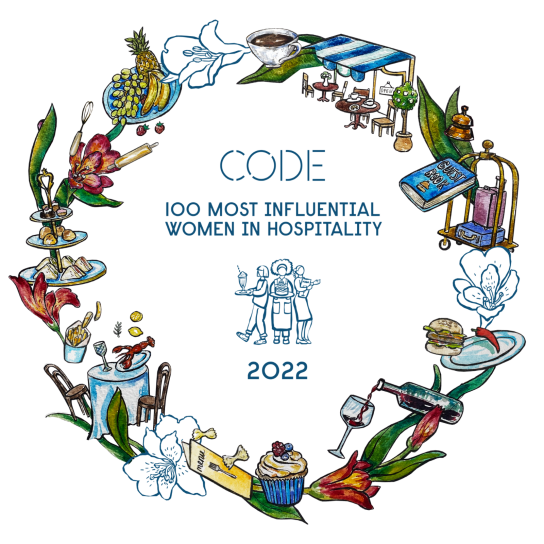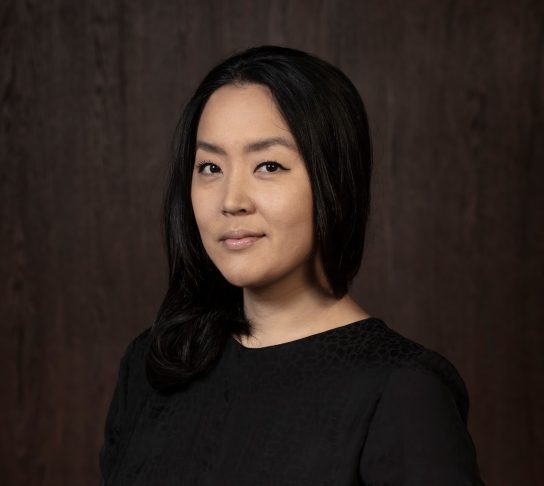
Women in Drink Award
sponsored by
Winner: Monica Berg

Berg is, without qualification, one of the best bartenders in the world. She has pioneered the use of seasonal, often unconventional ingredients in cocktails, while sticking to her ‘one sip’ philosophy: the idea that a drink’s full flavour must be tasted and experienced in a single sip. At Tayēr + Elementary, the bar she founded with Alex Kratena in 2019, staff collaborate on a daily changing menu, making use of whatever produce is freshest and available. It’s currently ranked second in The World’s 50 Best Bars. This year, Berg was named creative director at the Campari Academy, and continues work with the educational non-profit P(OUR).
CODE sat down with Berg to ask her about her extraordinary career.
What drew you to hospitality?
I just like working with people. I like the social aspect of it – the fact that you can be part of someone’s night out, but you don’t necessarily have to be out. Or you can be someone who directly impacts someone’s life – if they’re having a bad day, you can make it better.
What’s your favourite cocktail on the menu right now?
Well, I don’t know! The menu changes daily, so you try not to get too attached to any of the drinks. We work with seasonal ingredients a lot, creating drinks that are only possible at that time, in that moment.
In Elementary, we have drinks that stay on permanently, so I would say one of my favourites is the sandalwood martini, because I’m a martini person. A seasonal favourite right now is the watermelon negroni, which always comes on around this time, because right now the watermelon is amazing. The yuzu margarita is very popular with our guests.
You run Tayēr + Elementary, but you’re also involved in the non-profit P(OUR) and developed Back of House, an online platform where staff can anonymously report inappropriate behaviour. Can you talk a bit about that?
You always have two choices: you can either do things that are just going to benefit yourself, or you can do things that will also benefit everyone.
If you are at a point in your career where you have the ability to contribute and give back, I think that is important. If we only ever take, eventually there will be nothing left. That’s one of the reasons why Alex and I wanted to open our own bar. We worked with a lot of other people and for a lot of other people – and sometimes the best lessons are how not to do things. We wanted to see if it’s actually possible to live out some of the ideals that we have.
The Back of House idea came from when we set up here. At the time, we were even smaller than we are now, but we’re still a small team of 13 people. But that doesn’t mean that things can’t happen – it means that it can sometimes be even harder to flag if something is not right, because everybody is so tight, and everybody’s so confined in the same space. We wanted to make sure that even if we were a small team, and even if we spent a lot of time and effort trying to make people comfortable enough to communicate when they are not happy, you still have what you need to feel safe.
Do you think attitudes towards women in the industry have changed over the course of your career?
Yes and no. When I was a young girl, in the beginning of my career, I felt like I was just a bartender. Then, when you start to get a little bit more presence – or maybe it was just the evolution of society as whole – you become a ‘female’ bartender. But what’s the difference?
In Norway, there was a lot of strong female presence in bars when I was younger, so I never felt that it was a big deal. I mean, yes – you see that people talk to you slightly differently. But the clever owners would always seek to have a good balance between men and women.
Of course, you also get the stupid comments that you’re not as strong, you’re not as fast. But sometimes you don’t need to be strong and fast. My strength has never been that I’m strong and fast (even though I’m quite fast). But I’m smart.
My dad always used to say: ‘You either think, or you run. You can choose how you get there.’ In my experience, the best is always when you have a balance.
But yes – I wouldn’t be able to maybe put my finger on it, but there is a change. There’s more acceptance for stronger female personalities, and you don’t have to be apologetic about owning the space or your vibe.
Is there more to be done?
There needs to be a wider conversation. Yes – we need to continue to fight for women’s rights and have more female representation. But we also need to stop separating between men and women.
I think a lot of women can do more in the sense of being more welcoming to other women. On one side, we need to be better at supporting each other. But on the other hand, we need to be better at accepting that help, because help doesn’t come just from pictures on social media – it actually comes from trying to teach younger women how to be successful, and sometimes that’s by critiquing what’s being done (obviously with constructive criticism).
At the end of the day, the door can be opened, but you will have to go in yourself. And when you’re in there, you have to pull your weight. You can’t just say we need to have better opportunities for women. That’s absolutely, 100 per cent correct. But you also need to work hard, stand on your own two feet and be yourself. It’s still a teamwork situation.
So yes, it’s definitely a work in progress. But there’s still a long way to go for everyone.
Who’s been an inspiration to you in your career?
Someone who has been very influential in my life is a chef, actually. She’s from Norway and her name is Heidi Bjerkan. I don’t know anyone who works harder than her, but she’s also someone who sticks to her beliefs and principles regardless and is willing to stand – not just talk the talk but walk the walk. And she works with ingredients and flavours in a magical way. From the moment I met her, I just knew that this was someone I just wanted to have in my life.
Her, and many others as well who are very strong individuals. And on the opposite side, I’ve also had many men in my life, male bosses who were advisors. Even like someone like Alex, who has shaped so much of who I became just by taking the time to support me, believe in me, help me when I need it.
What’s the best advice you’ve ever been given? I like your dad’s adage.
Well, he’s the gift that keeps on giving. And I think it’s probably something similar.
There are no shortcuts – if you really want something, you have to work for it. You have to decide what you want. When you know what you want, you eliminate everything else, because things are never going to be easy. At the end of the day, you need to be very sure.
Until you’re sure, it’s fine to just float around. For the first 10 years of my career in this industry, I was super selfish. The only thing that drove me was what I wanted to learn about. I never followed the conventional wisdom of ‘you need to spend one year minimum at one place before you can go, otherwise it looks bad on your CV’. When you’re young, you have this privilege of being selfish. You can, if you want to, learn how to polish rice for sake. You can spend three months learning about that.
Fake it till you make it, I think, is the worst advice that you can give anyone, because you shouldn’t fake anything. You should either learn how to do it or not do it at all.
So: learn everything that you need to learn while you’re young and have fun doing so. When you grow up, hopefully, you will have the knowledge that will give you the job and career and life that you want. And that is, at the end of the day, what makes you happy.
A message from the award sponsor
The drinks industry is one that has typically been male dominated – whether that’s in the winery or behind the bar. Despite many more women in senior positions in the past decade, there is still work to do.
At Bibendum, we love to champion women in wine. We recently launched our Women in Wine series, highlighting women from across our business and celebrating the journey they’ve taken in their careers. We hosted a magnificent dinner with CODE back in May that brought together women across the wine industry and we are incredibly proud to sponsor the Women in Drink award as part of CODE’s 100 Most Influential Women in Hospitality.
Not only does the list honour the amazing achievements and professional successes of women in hospitality, but it also inspires the next generation and celebrates the diversity of the industry. Congratulations to all those on the list!
Read more about Bibendum Wine here
Read this year’s full list of our 100 Most Influential Women in Hospitality here

